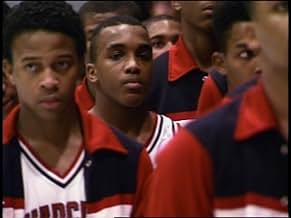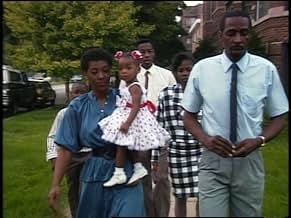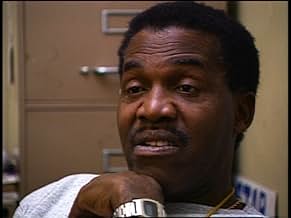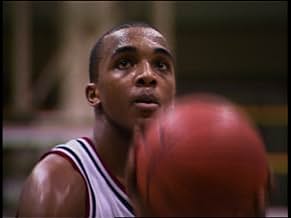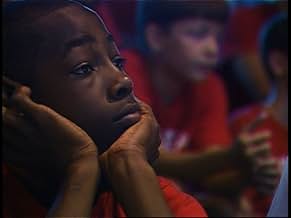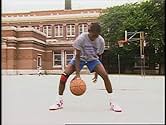A film following the lives of two inner-city Chicago boys who struggle to become college basketball players on the road to going professional.A film following the lives of two inner-city Chicago boys who struggle to become college basketball players on the road to going professional.A film following the lives of two inner-city Chicago boys who struggle to become college basketball players on the road to going professional.
- Nominated for 1 Oscar
- 23 wins & 9 nominations total
Marlyn Hopewell
- Self - High School Guidance Counselor
- (as Sister Marlyn Hopewell)
Featured reviews
10dee.reid
"Hoop Dreams" is a film about real life, because that is what it's exactly about, real life. I feel that I must put a stronger emphasis on the word "real" to get my point across. This isn't some hokey, Hollywood drama about living out a dream, but is about two aspiring young athletes rising out of the dredges of the Chicago ghetto life and into the flash and glitter of the NBA.
Though I'm not a hardcore sports fan, nor am I really into movies about sports, but I really admire basketball, as I feel it has a kind of grace and natural balance that's lacking in most other sports this vigorous. That is why I like some of the film's exhilarating on-court action that is interspersed evenly with the human drama.
Directed by Steve James and produced by Frederick Marx and Peter Gilbert, "Hoop Dreams" originally began as a 30-minute documentary about rising ballplayers, but the filmmakers quickly saw that 30 minutes was just too narrow a scope for their story. This realization came when they witnessed two teens, William Gates and Arthur Agee, as they both try to join the NBA, much like their idol Isiah Thomas.
In total, 250+ hours of footage was gathered over the course of a five-year period and then edited into an engaging 171-minute documentary, following the two teens (from ages 14-18), as they attend expensive Catholic schools, go through the rigorous on-court training, meet the demands of their coaches, and live out their dreams. (Director Spike Lee also appears at a training camp and gives some of the aspiring players some less-than-inspiring advice about what their skills mean to the people at the top of the ladder.)
We watch as their poignant, real-life struggles unfold on the screen, and watch as time after time they get stonewalled by the system of bureaucracy and racism that's meant to be especially hard on two young black boys from the ghetto. They have difficulty with making decent grades, financial issues, preparing for the ACT, sports-related injuries, and must contend with problems at home as well, including trouble with family matters (Arthur's relationship with his father is especially touching and sad; William welcomes a new addition to his family while still in high school).
For years, success stories, such as "Hoop Dreams," have dominated Hollywood cinema and have won over legions of audiences, but we've never seen anything like this. Gates and Agee are both bright-eyed and ambitious that they're embarking on something that's historically significant to their lives and community.
This is the best movie about basketball and reality I've seen yet because of the simple fact that it's real; no scripts, no phony Hollywood theatrics, just "real" action, drama, and emotions.
10/10
Though I'm not a hardcore sports fan, nor am I really into movies about sports, but I really admire basketball, as I feel it has a kind of grace and natural balance that's lacking in most other sports this vigorous. That is why I like some of the film's exhilarating on-court action that is interspersed evenly with the human drama.
Directed by Steve James and produced by Frederick Marx and Peter Gilbert, "Hoop Dreams" originally began as a 30-minute documentary about rising ballplayers, but the filmmakers quickly saw that 30 minutes was just too narrow a scope for their story. This realization came when they witnessed two teens, William Gates and Arthur Agee, as they both try to join the NBA, much like their idol Isiah Thomas.
In total, 250+ hours of footage was gathered over the course of a five-year period and then edited into an engaging 171-minute documentary, following the two teens (from ages 14-18), as they attend expensive Catholic schools, go through the rigorous on-court training, meet the demands of their coaches, and live out their dreams. (Director Spike Lee also appears at a training camp and gives some of the aspiring players some less-than-inspiring advice about what their skills mean to the people at the top of the ladder.)
We watch as their poignant, real-life struggles unfold on the screen, and watch as time after time they get stonewalled by the system of bureaucracy and racism that's meant to be especially hard on two young black boys from the ghetto. They have difficulty with making decent grades, financial issues, preparing for the ACT, sports-related injuries, and must contend with problems at home as well, including trouble with family matters (Arthur's relationship with his father is especially touching and sad; William welcomes a new addition to his family while still in high school).
For years, success stories, such as "Hoop Dreams," have dominated Hollywood cinema and have won over legions of audiences, but we've never seen anything like this. Gates and Agee are both bright-eyed and ambitious that they're embarking on something that's historically significant to their lives and community.
This is the best movie about basketball and reality I've seen yet because of the simple fact that it's real; no scripts, no phony Hollywood theatrics, just "real" action, drama, and emotions.
10/10
Engrossing documentary about two inner city kids and their struggles to make it into professional basketball.
"Hoop Dreams" made a big splash when it was released in 1994, and there was a big controversy around Academy Award time when it was deemed ineligible in the Best Documentary category. It likely would have won had it been nominated, and it ranks right up there among some of the best documentaries of all time. This is mostly due to how engrossing the storytelling is. You forget you're not watching a fictional film, which just supports the claim that truth can be more compelling than fiction.
You don't have to be a fan of basketball to enjoy this movie.
Grade: A
"Hoop Dreams" made a big splash when it was released in 1994, and there was a big controversy around Academy Award time when it was deemed ineligible in the Best Documentary category. It likely would have won had it been nominated, and it ranks right up there among some of the best documentaries of all time. This is mostly due to how engrossing the storytelling is. You forget you're not watching a fictional film, which just supports the claim that truth can be more compelling than fiction.
You don't have to be a fan of basketball to enjoy this movie.
Grade: A
10Agent10
This film simply exemplifies the reason why I hate most Oscar voters. This movie didn't even get a nomination, and it was one of the most successful documentaries ever! This especially exhibits the encroachment of coaches, family and other parties when it comes to the well being of inner city kids, who just happen to be good basketball players. Considering the state of pro basketball now, this kind of shows how the downward cycle of basketball was seeking lower standards. Sometimes funny, often times sad and poignant, this film is easily one of the best documentaries of all time.
The filmmakers here show an admirable dedication to their art and to the underprivileged, spending five years tracking two kids, Arthur and William, and their dreams of basketball stardom. The two subjects and their families are simple and somewhat naive, in an endearing way. Their struggles, sometimes unflattering, are put forth for us to relate to, and we all can. Of course this is about two kids and their love for basketball, and about the "road to" that takes place as they try to get there, but it's really about the way people in near-poverty live, the education system and its downfalls, the manipulation of organized sports and tendency for people to try and achieve their goals through others (Arthur's father, William's brother), and the situation between blacks and whites in America. In one scene, Arthur laments being around mainly white kids for the first time in his life, and says it'll be difficult but he'll manage. That kind of relaxed confidence is so rewarding to watch. The film has endless insights into the black urban experience. Of course not every family in the ghetto is in a position where a father is a criminal and drug user, but when two kids in the same story are in that situation, it's got to be somewhat prevalent.
It's the kind of movie that's sustaining, and there are so many transcendent, revealing moments that stand out: Arthur's mother, such an inspirational woman to watch, as she gets her nurse certification; Arthur's family talking to another family in a cafeteria, with his mother high-fiving an elderly white lady; the descent into and path out of drug addiction; and a scene where the man who recruits these boys says that sometimes he has doubts about himself when he sees the pain that's a part of these kids' lives. Spike Lee makes a brief appearance giving a speech to the kids, and his pessimism is the only sore spot in the film.
We don't have to work for any of this, we don't have to question it. There's nothing to clean away before we can get to the real thing. This is the real thing. A curious moment, however, is one scene where Arthur's mother explains to us at one point she had her electricity cut off, which suggests that the crew wasn't there to film that period. But the next scene has her walking in the dark with a lamp, that seems like an undeclared "reenactment" of something they missed, for editing purposes. But the criticism of manipulation in documentaries is tired. Yes, the possibility of tricking an audience into believing something with a documentary is greater, but unless it's political in some respect it doesn't matter. Documentaries are supposed to be presented how the filmmaker sees fit. With no license, we'd have 350-hour documentaries.
At one moment near the end, William's coach says goodbye to him and as he walks out his coach mentions that that's the system: one goes out, another comes in. It feels like we're saying bye to a member of the family. This is a life-affirming experience, a family that should be visited again. 10/10
It's the kind of movie that's sustaining, and there are so many transcendent, revealing moments that stand out: Arthur's mother, such an inspirational woman to watch, as she gets her nurse certification; Arthur's family talking to another family in a cafeteria, with his mother high-fiving an elderly white lady; the descent into and path out of drug addiction; and a scene where the man who recruits these boys says that sometimes he has doubts about himself when he sees the pain that's a part of these kids' lives. Spike Lee makes a brief appearance giving a speech to the kids, and his pessimism is the only sore spot in the film.
We don't have to work for any of this, we don't have to question it. There's nothing to clean away before we can get to the real thing. This is the real thing. A curious moment, however, is one scene where Arthur's mother explains to us at one point she had her electricity cut off, which suggests that the crew wasn't there to film that period. But the next scene has her walking in the dark with a lamp, that seems like an undeclared "reenactment" of something they missed, for editing purposes. But the criticism of manipulation in documentaries is tired. Yes, the possibility of tricking an audience into believing something with a documentary is greater, but unless it's political in some respect it doesn't matter. Documentaries are supposed to be presented how the filmmaker sees fit. With no license, we'd have 350-hour documentaries.
At one moment near the end, William's coach says goodbye to him and as he walks out his coach mentions that that's the system: one goes out, another comes in. It feels like we're saying bye to a member of the family. This is a life-affirming experience, a family that should be visited again. 10/10
"Basketball is a ticket out of ghetto." (William Gates)
"... nobody cares about you. You're a black, you're a young male... The only reason why you're here [Nike training camp] is so you can make their team win. And if the team wins these schools get a lot of money." (Spike Lee)
These phrases, which have persisted as common knowledge among the African-American community during last several decades, have become familiar to the non-hyphenated Americans in the 90s, thanks to the films such as Boyz N the Hood and He Got Game. Among them, Hoop Dreams, a documentary that follows two black youths during a five-year period, is the most objective and the most quiet, but the most powerful statement to represent the disadvantaged youth in urban America.
The film reveals the pattern they follow. Being deluded by the luxurious surface of pro sports, they neglect education and then ending up going nowhere. The community suffers the vicious cycle and their feelings that the system exploits them remain.
Kudos to the filmmakers for their insane amount of work. They must have gone through numerous negotiations to attend and film various scenes, such as family's private events, classrooms, academic counseling, recruiting sessions with college coaches, and surgery operation rooms.
"... nobody cares about you. You're a black, you're a young male... The only reason why you're here [Nike training camp] is so you can make their team win. And if the team wins these schools get a lot of money." (Spike Lee)
These phrases, which have persisted as common knowledge among the African-American community during last several decades, have become familiar to the non-hyphenated Americans in the 90s, thanks to the films such as Boyz N the Hood and He Got Game. Among them, Hoop Dreams, a documentary that follows two black youths during a five-year period, is the most objective and the most quiet, but the most powerful statement to represent the disadvantaged youth in urban America.
The film reveals the pattern they follow. Being deluded by the luxurious surface of pro sports, they neglect education and then ending up going nowhere. The community suffers the vicious cycle and their feelings that the system exploits them remain.
Kudos to the filmmakers for their insane amount of work. They must have gone through numerous negotiations to attend and film various scenes, such as family's private events, classrooms, academic counseling, recruiting sessions with college coaches, and surgery operation rooms.
Did you know
- TriviaAccording to Roger Ebert, after the film failed to receive an Oscar nomination for Best Documentary, he and Gene Siskel learned about the nominating process. He said that members of the Academy's documentary committee held flashlights when they watched documentaries, and anyone who had "given up" could wave it against the screen. The movie was turned off if a majority waved their flashlights. This film was turned off after 15 minutes.
- Quotes
William Gates: That's why when somebody say, "when you get to the NBA, don't forget about me", and that stuff. Well, I should've said to them, "if I don't make it, don't you forget about me."
- Crazy creditsThanks to the St. Joseph High School community and Coach Gene Pingatore who agreed to participate in a not for profit Kartemquin Educational film telling William and Arthur's stories. Today, St. Joseph, with a 39% minority enrollment, remains committed to the dream of a better life for all. Awarding need based financial aid to 40% of its students, St. Joseph with limited resources continues to maintain its academic excellence. A Hoop Dreams Fund has been set up to provide academic scholarships.
- SoundtracksIn This Very Room
Words & Music by Ron & Carol Harris
© 1979 Ron Harris Music (ASCAP)
All Rights Reserved.
All Rights Reserved. International Copyright Secured. Used by Permission.
- How long is Hoop Dreams?Powered by Alexa
Details
Box office
- Budget
- $700,000 (estimated)
- Gross US & Canada
- $7,830,611
- Opening weekend US & Canada
- $18,396
- Oct 16, 1994
- Gross worldwide
- $11,830,611
- Runtime2 hours 50 minutes
- Color
- Sound mix
Contribute to this page
Suggest an edit or add missing content





